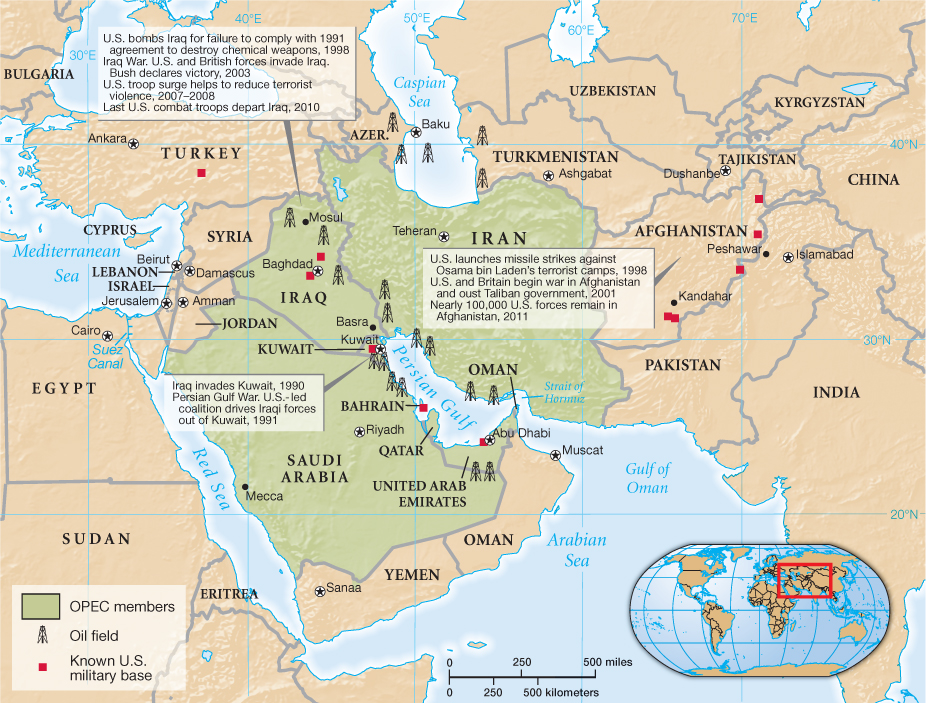Going to War in Central America and the Persian Gulf.
Printed Page 854 Chapter Chronology
Going to War in Central America and the Persian Gulf. President Bush won greater support for his actions abroad. In Central America, the United States had depended on Panamanian dictator Manuel Noriega for helping the Contras in Nicaragua and providing the CIA with information about Communist activities in the region. But in 1989, after an American grand jury indicted Noriega for drug trafficking and after his troops killed an American Marine, Bush ordered 25,000 military personnel into Panama. In Operation Just Cause, U.S. forces quickly overcame Noriega's troops, sustaining 23 deaths, while hundreds of Panamanians, including many civilians, died. Colin Powell noted that "our euphoria over our victory in Just Cause was not universal." Both the United Nations and the Organization of American States censured the unilateral action by the United States.
Map Activity 1 for Chapter 31

By contrast, Bush's second military engagement rested solidly on international approval. Viewing Iran as America's major enemy in the Middle East, U.S. officials had quietly assisted the Iraqi dictator Saddam Hussein in the Iran-Iraq war, which began in 1980 and ended inconclusively in 1988. In August 1990, Hussein sent troops into the small, oil-rich country of Kuwait (Map 31.1), and the invasion soon neared the Saudi Arabian border, threatening the world's largest oil reserves. President Bush quickly ordered a massive mobilization of American forces and assembled an international coalition to stand up to Iraq. He invoked principles of national self-determination and international law, but long-standing interests in Middle Eastern oil also drove the U.S. response.
Reflecting the easing of Cold War tensions, the Soviet Union voted for a UN embargo on Iraqi oil and authorization for using force if Iraq did not withdraw from Kuwait by January 15, 1991. By then, the United States had deployed more than 400,000 soldiers to Saudi Arabia, joined by 265,000 troops from two dozen other nations, including several Arab states. "The community of nations has resolutely gathered to condemn and repel lawless aggression," Bush announced. "With few exceptions, the world now stands as one."
With Iraqi forces still in Kuwait, in January 1991 Bush asked Congress to approve war. Considerable sentiment favored waiting to see if the embargo and other means would force Hussein to back down, a position quietly urged within the administration by Colin Powell. Congress debated for three days and then authorized war by a margin of five votes in the Senate and sixty-seven in the House, with most Democrats in opposition. On January 17, 1991, the U.S.-led coalition launched Operation Desert Storm, a forty-day bombing campaign against Iraqi military targets, power plants, oil refineries, and transportation networks. Having severely crippled Iraq by air, the coalition then stormed into Kuwait, forcing Iraqi troops to withdraw (see Map 31.1).
"By God, we've kicked the Vietnam syndrome once and for all," President Bush exulted on March 1. Most Americans found no moral ambiguity in the Persian Gulf War and took pride in the display of military prowess. The United States stood at the apex of global leadership, steering a coalition in which Arab nations fought beside their former colonial rulers.
Persian Gulf War
1991 war between Iraq and a U.S.-led international coalition. The war was sparked by the 1990 Iraqi invasion of Kuwait. A forty-day bombing campaign against Iraq followed by coalition troops storming into Kuwait brought a quick coalition victory.
Some Americans criticized the Bush administration for ending the war without deposing Hussein. But Bush pointed to the limited UN mandate and to Middle Eastern leaders' concerns that an invasion of Iraq would destabilize the region. His secretary of defense, Richard Cheney, doubted that coalition forces could secure a stable government to replace Hussein and considered the price of a long occupation too high. Instead, administration officials counted on Hussein's pledges not to rearm or develop weapons of mass destruction, secured by a system of UN inspections, to contain him.
Yet Middle Eastern stability remained elusive. Israel, which had endured Iraqi missile attacks, was more secure, but the Israeli-Palestinian conflict seethed. Despite military losses, Saddam Hussein remained in power and turned his war machine on Iraqi Kurds and Shiite Muslims whom the United States had encouraged to rebel. Hussein also found ways to conceal arms from UN weapons inspectors before he threw the inspectors out in 1998. Finally, the decision to keep U.S. troops based in Saudi Arabia, the holy land of Islam, fueled the hatred and determination of Muslim extremists like Osama bin Laden.